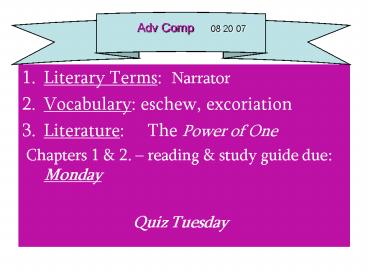Literary Terms: Narrator - PowerPoint PPT Presentation
1 / 11
Title:
Literary Terms: Narrator
Description:
Example: In Cinderella, several important plot events, such as the finding of the glass slipper, take place when Cinderella herself ... – PowerPoint PPT presentation
Number of Views:172
Avg rating:3.0/5.0
Title: Literary Terms: Narrator
1
Adv Comp 08 20 07
- Literary Terms Narrator
- Vocabulary eschew, excoriation
- Literature The Power of One
- Chapters 1 2. reading study guide due
Monday - Quiz Tuesday
2
Adv Comp 08 20 07
- Literary Terms Narrator
3
Narrator
- The voice telling the story. This voice might
belong to a Character in the story whom other
characters can see, hear, interact with, etc.
or the voice might appear to belong to the
author. The narrator may fit into one or more of
these categories - First-person narrator stands out as a character
and refers to himself or herself, using I.
Example Jane Eyre narrates Charlotte Brontes
novel Jane Eyre, which allows Bronte to let her
readers know just how the limitations of Janes
life galled her, and how Jane secretly fell in
love with her employer, Mr. Rochester.
4
Narrator
- Second-person narrator addresses the reader
and/or the Main Character as you (and may also
use first-person narration, but not necessarily).
Example This technique is rarely used, except
briefly Beatrix Potter addresses the readers
near the end of Peter Rabbit in order to
underline the proper moral which the bulk of
the story undermines. Another brief example is
the opening of each of Rudyard Kiplings Just-So
Stories, in which the narrator refers to the
child-listener as O Best-Beloved.
5
Narrator
- Third-person narrator not a character in the
story refers to the storys characters as he
and she. This is probably the most common form
of narration, so I wont give a specific example.
- Limited Narrator can only tell what one person
is thinking or feeling. Example in Peter Rabbit,
we dont find out what Mr. McGregor thinks about,
or what Mother rabbit thinks about, or what
Flopsy, Mopsy, and Cottontail thought about
only what Peter thinks about. - Omniscient narrator not a character in the
story can tell what any or all characters are
thinking and feeling. Example In Cinderella,
several important plot events, such as the
finding of the glass slipper, take place when
Cinderella herself is not present in these
scenes, the audience sometimes knows what other
characters, like the Prince or the stepmother,
are thinking.
6
Narrator
- Reliable narrator everything this narrator says
is true, and the narrator knows everything that
is necessary to the story. - Unreliable narrator may not know all the
relevant information may be intoxicated or
mentally ill may lie to the audience. Example
Edgar Allan Poes narrators are frequently
unreliable. Think of the delusions that the
narrator of The Tell-Tale Heart has about the old
man, or consider the lying narrator in Poes
Black Cat.
7
Narrator
- The type of narrator telling the story can be
vitally important to you as the reader or
interpreter, especially if the narrator is
unreliable. Not every unreliable narrator is as
easy to spot as Poes in The Tell-Tale Heart
there may be a lot of scholarly debate about
whether a given narrator is reliable or not, and
obviously you need to know how much of the
narration you can trust. If you cannot trust the
narrator to tell you what happened, then just
summarizing the events of the story can be very
challenging. A first-person narrator may easily
be a little unreliable, since everyone wants to
tell his/her own story in a way which shows
himself or herself in a good light. If the
narration is limited, why has the author chosen
to show readers only this persons thoughts? If
the narrator addresses the reader directly, does
that draw you in or alienate you? All these
issues and more arise when discussing the
narrators. (See also Point of View
8
Adv Comp 08 20 07
- Vocabulary eschew, excoriation
9
Unit 1
- Eschew (verb) to avoid, shun, keep away from.
eschew bad habits - Excoriation (noun) a strong denunciation the
act of stripping away the skin. a violent
excoriation of the traitor
10
Adv Comp 08 20 07
- Literature The Power of One
- Chapters 1 2. reading study guide due
Monday - Quiz Tuesday
11
Adv Comp 08 20 07
- Literary Terms Narrator
- Grammar Collective Nouns
- Vocabulary belabor, carping, coherent
- Discussion on Individuals in Society
- Creative Writing coherent paragraph on
Individuals in Society - Literature The Power of One
- Chapters 1 2. reading study guide due
Monday

